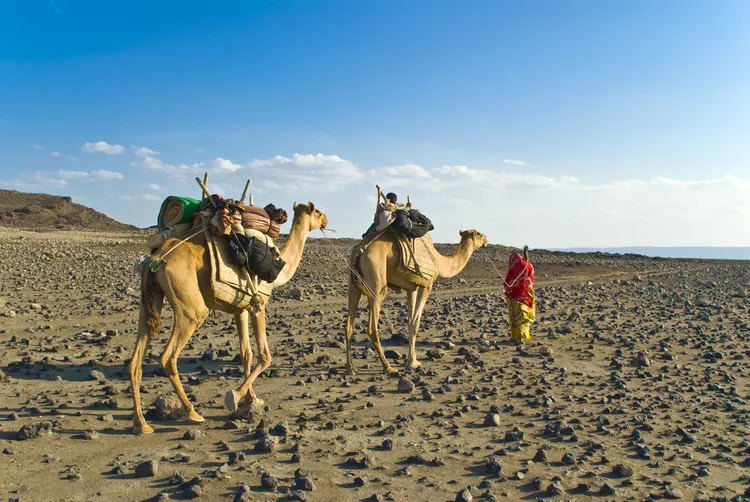Summary
Djibouti is a tiny nation sandwiched between Ethiopia and Eritrea in the Horn of Africa. Much of the country remains undeveloped, making it a fantastic destination for eco-tourists looking to get off the beaten track. The interior is dominated by a kaleidoscope of extreme landscapes ranging from plunging canyons to salt-encrusted lakes, while the coast offers excellent scuba diving opportunities and the chance to snorkel alongside the world’s largest fish. The country’s capital, Djibouti City, is an urban playground on the rise with one of the region’s finest culinary scenes.
Location:
Djibouti is part of East Africa. It shares borders with Eritrea (to the north), Ethiopia (to the west and south), and Somalia (to the south). Its coastline lies along the Red Sea and the Gulf of Aden.
Geography:
Djibouti is one of the smallest countries in Africa, with a total area of 8,880 square miles/23,200 square kilometers. To put this into perspective, it is slightly smaller than the American state of New Jersey.
Capital City:
The capital of Djibouti is Djibouti City.
Population:
As of July 2016, the estimated population of Djibouti was 846,687 according to the CIA World Factbook. Over 90% of Djibouti’s residents are under 55 years of age, with an average life expectancy of 63 years.
Languages:
French and Arabic are the official languages of Djibouti; however, the majority of the population speaks either Somali or Afar as their first language.
Religion:
Islam is the most widely practiced religion in Djibouti, comprising 94% of the populace. The remaining 6% practice various denominations of Christianity.
Currency:
The currency used in Djibouti is the Djiboutian franc. For up-to-date exchange rates, you can utilize an online currency converter.
Climate:
Djibouti experiences a hot climate year-round, with temperatures in Djibouti City rarely falling below 68°F/20°C during winter (December – February). Coastal areas and the north can also be quite humid during these months. Summer temperatures often exceed 104°F/40°C, while visibility may be diminished by the khamsin, a dust-laden wind. Although rains are rare, they can be briefly intense, especially in the central and southern areas.
When to Go:
The ideal time to visit is during the winter months (December – February), when temperatures are most manageable, but sunshine is abundant. Additionally, if you plan to swim with Djibouti’s famous whale sharks, aim to visit between October and February.
Key Attractions
Djibouti City
Founded in 1888 as the capital of French Somaliland, Djibouti City has transformed into a vibrant urban center over the years. Its eclectic restaurant and bar scene make it the second richest city in the Horn of Africa. The city features a cosmopolitan vibe, blending traditional Somali and Afar culture with influences from its diverse international community.
Known as Lac Assal, this stunning crater lake is situated 70 miles/115 kilometers west of the capital. At 508 feet/155 meters below sea level, it is the lowest point in Africa. This area showcases breathtaking natural beauty, with turquoise waters contrasting against white salt along the shores. Visitors can observe locals harvesting salt with their camels, a tradition that has persisted for centuries.
Moucha & Maskali Islands
Located in the Gulf of Tadjoura, the islands of Moucha and Maskali boast excellent beaches and thriving coral reefs. Popular activities include snorkeling, diving, and deep-sea fishing. However, the main allure occurs between October and February when migrating whale sharks visit the islands. Snorkeling with these magnificent creatures is a definite highlight of any Djibouti experience.
The Goda Mountains in the northwest offer a refreshing contrast to the country’s arid landscapes. Lush vegetation thrives on mountains reaching heights of up to 5,740 feet/1,750 meters. Rural Afar villages provide insights into Djibouti’s traditional culture, while the Day Forest National Park is perfect for birding and wildlife enthusiasts.
Getting There
Djibouti–Ambouli International Airport serves as the main entry point for most international travelers. Located approximately 3.5 miles/6 kilometers from Djibouti City, airlines such as Ethiopian Airlines, Turkish Airlines, and Kenya Airways frequently operate flights here. Alternatively, a train journey from Ethiopia’s Addis Ababa and Dire Dawa provides another route. All foreign visitors require a visa to enter Djibouti; some nationalities (including U.S. citizens) can purchase a visa upon arrival. For additional information, you may refer to this website or consult your local embassy.
Medical Requirements
Before traveling to Djibouti, ensure your routine vaccinations are up to date. It is also advisable to get vaccinated against Hepatitis A and Typhoid. Anti-malaria medication is recommended, and travelers coming from yellow fever-infected areas must present proof of vaccination upon entry. For further details, check the Centers for Disease Control and Prevention website.





